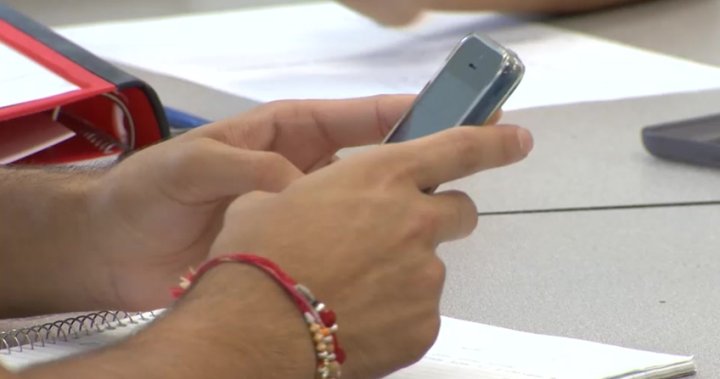As the school year comes to a close in Canada, several provinces are announcing restrictions on cellphone use in schools, set to take effect this fall. Quebec, B.C., Alberta, Ontario, Nova Scotia, and New Brunswick have all announced plans to stop students from using their cellphones during class time. Jennifer Flanagan, CEO of Actua, believes that limiting cellphone use during class will benefit student learning as distraction is already a significant issue. Each province has its own specific rules regarding cellphone use, with some allowing for educational purposes and others requiring phones to be stored away during school hours.
In Quebec, restrictions on cellphone use are limited to the classroom, with students in public elementary and high schools still allowed to use their phones between classes. Ontario, Nova Scotia, and New Brunswick have similar policies, with students required to keep their phones out of sight during school hours. In Ontario and Nova Scotia, younger students must keep their phones stored until the end of the day, while secondary students may be allowed to use them at lunch or between lessons. B.C. has also implemented restrictions on cellphone use, enforcing a “bell-to-bell” policy. Alberta recently announced its policy for all grades, with devices required to remain out of sight except for specialized learning or health needs.
Sachin Maharaj, an educational leadership professor at the University of Ottawa, believes that the varying restrictions on cellphone use come down to implementation and the need for buy-in from parents. He emphasizes the importance of a tiered approach that takes into account the role of parents in purchasing and sending devices to school with their children. Maharaj also highlights the impact that devices and social media can have on academic development, referencing studies showing a decline in academic performance among 15-year-olds in Canada. Some provinces have stated that school boards and districts will determine how policies are implemented and how students will be reprimanded.
It remains to be seen whether other provinces and territories will adopt similar initiatives before the start of the school year this fall. Flanagan believes that having these restrictions in place is sparking important conversations about how to keep kids safe online, educate them about being responsible online citizens, and promote healthy online habits. She views these restrictions as an opportunity to address important issues related to technology use and social media. Ultimately, the decision to implement cellphone restrictions in schools is driven by a recognition of the potential negative impacts of excessive device use on student learning and development.
Overall, the shift towards limiting cellphone use in schools is a response to concerns about distractions, academic performance, and online safety. By introducing policies that regulate cellphone use during school hours, provinces are aiming to create a more focused and productive learning environment for students. The involvement of parents, school boards, and districts in the implementation of these policies is seen as crucial to ensuring buy-in from all stakeholders. As technology continues to play a significant role in students’ lives, it is important for educators, parents, and policymakers to work together to promote responsible and healthy technology use in schools.













